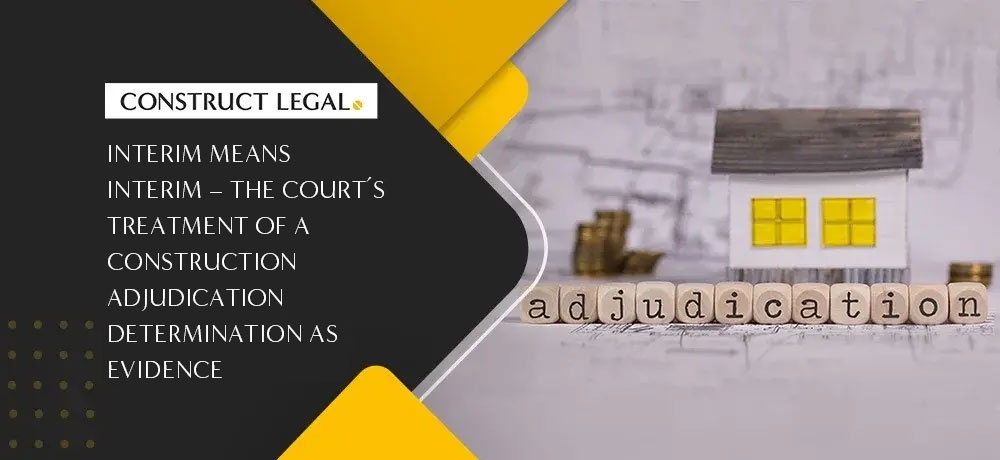Interim Means Interim – The Court’s Treatment of a Construction Adjudication Determination as Evidence

The case law on construction dispute interim adjudications in Ontario continues to develop. In the recent case of Arad Incorporated v Rejali et al (“Arad”),1 the court provided helpful guidance to the construction and legal industries about how an adjudicator’s determination may be treated by the court as evidence.
Background
In Arad, a payment dispute arose between the contractor and owner of a construction project. The contractor registered a lien against the property and started a lawsuit. The owner paid security into court for the contractor’s lien. The contractor and owner also commenced adjudications against each other. The contractor claimed for monies allegedly owed for work performed. The owner claimed for monies alleged overpaid to the contractor. The adjudicator determined that neither party was liable to pay the other and dismissed both adjudications.
After the adjudication, the owner brought a motion in court seeking the return of the security that the owner paid into court, on the basis that the adjudicator dismissed the contractor’s claim in the adjudication. Section 13.13(7) of the Construction Act allows the determination and reasons of an adjudicator to be admissible as evidence in court.
The court’s analysis
The court in Arad first reviewed the nature of an adjudicators’ determinations, emphasizing their interim nature. Adjudication determinations are not binding on the court, meaning the court may take the adjudicator’s determination into consideration when deciding a case (including whether to reduce or return lien security) but the court does not have to follow the adjudicator’s determination.
The court then considered whether it would be appropriate to reduce or return the lien security in this specific case. Except for the adjudicator’s determinations, there was no other substantive evidence about the claims before the court. Typically, when a party brings a motion in court to return lien security, the court applies a high standard and will only order the return of security if the party proves that “there is no reasonable prospect” of the lien claimant proving that its claim attracts the need for lien security. The adjudicator’s determinations did not meet this high standard.
The court also made some statements comparing evidence in a construction adjudication and evidence in a court proceeding. The court explained that adjudication is an interim procedure to provide a quick and efficient determination, and the rules of evidence may not be strictly followed. The evidence in an adjudication may not go through discovery or cross-examination, both of which are common in court proceedings.
Key takeaways
Adjudication is an interim process that is designed to resolve claims quickly and efficiently, and to keep money flowing on construction projects. Because it is “interim”, the court is not bound by the adjudicator’s determination, and adjudication does not fully resolve claims relating to liens or lien security. Even if an adjudicator has made a determination, parties may still litigate the dispute in court.
If you have any questions about construction disputes, including adjudication and liens, please contact a member of Construct Legal.
The information contained in this article is not legal advice.
1 Arad Incorporated v. Rejali et al, 2023 ONSC 3949